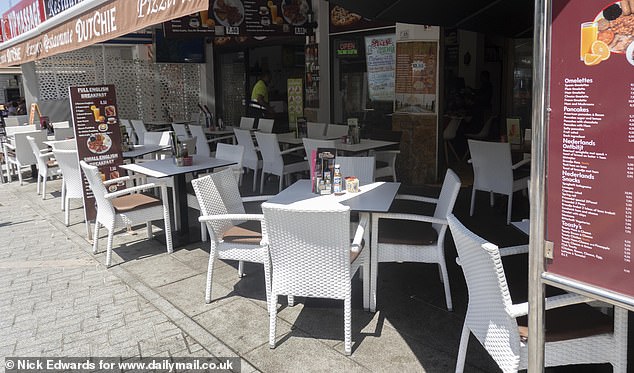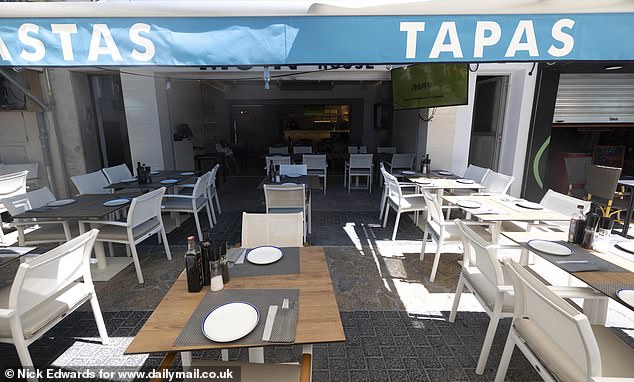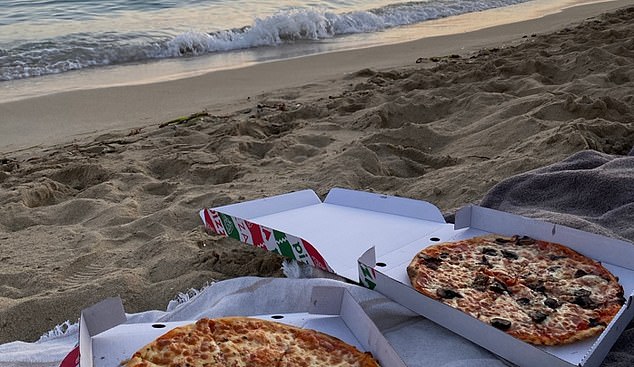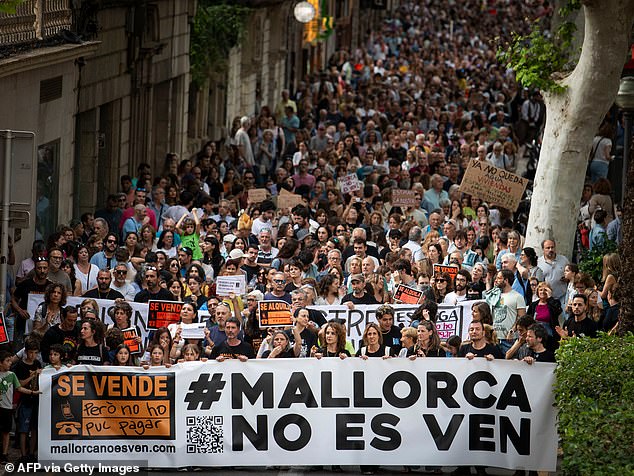By JOANNA TWEEDY, SENIOR JOURNALIST
Published: | Updated:
Britain’s cost-conscious tourists are contributing to a ‘hospitality crisis’ in one of the most popular tourist hotspots on Mallorca – because they’re choosing to buy food from supermarkets rather than eat out.
Miguel Carrió, president of the restaurants association on Paseo Mallorca, usually one of Palma’s busiest dining areas, said while the number of tourists visiting remains at a record high, they’re not parting with their holiday money in the way they once did.
He said that while ‘Palma is full’, tourists are eating out far less, choosing to self-cater in their hotel rooms or at the beach rather than dine in local restaurants.
Carrió added: ‘You see tourists staying in four-star hotels for €300 a night. But they don’t go to bars or restaurants.
‘They go to a supermarket, to the prepared food section, and take a loaf of bread and a slice of pizza to eat in their rooms.’
He said that rising prices have seen tourists ditching expensive meals out, saying: ‘Families don’t have €3,000 to come on vacation. Plane tickets cost €1,000; there’s another €200 for a night in a hotel. How much does a week’s vacation in Mallorca cost? €5,000?’
The hospitality industry official added, reports the Majorca Daily Bulletin, that rather than families paying €200 for a meal out, ‘many people prefer to pack their Tupperware to go to the beach’.
Rising prices of ingredients, including ‘eggs, oil, and other raw materials’, is also hitting restaurants hard on the island, Carrió warned, saying those in the industry now faced a tough winter trying to keep businesses afloat.


Mallorca’s beach businesses are already reporting they’re enduring a brutal summer season, with earnings plummeting as the backlash against mass tourism intensifies both in Spain and abroad.
According to the Association of Temporary Services Concessions and Operations in the Maritime-Terrestrial Public Domain of Mallorca (Adopuma), beach bars, parasol hire companies, and water activity operators have taken a hit of around 20 per cent in July compared to last summer, and things aren’t looking any better as August rolls on.
In a gloomy statement this week, the group blamed poor spring weather, spiralling costs, and falling demand for beach services.
But they say that increasingly aggressive rhetoric from anti-tourism campaigners is pushing the island’s economy to the brink.
Adopuma president Onofre Fornés said ‘irresponsible negative messages against tourism’ for the downturn.
Beach tourists, the bread and butter of Mallorca’s daytime economy, are no longer spending like they used to, he added.
He said: ‘Reduced income, higher operating costs and subdued demand for key services, such as sun loungers and deckchairs, have affected turnover, for example in areas such as Playa de Muro and Can Picafort.’
Many have been priced out of extras like parasols and cocktails after shelling out more than ever on flights and hotels.


According to the association, restaurants are underperforming, beach bar takings are down, and occupancy rates have stayed low even into early August.
Staff wages and the cost of goods have both gone up, chewing into profits and leaving many businesses worried about survival, the group warned.
Operators in resorts like Cala Millor say tourists are holding off on spending until the very last day of their holidays, a far cry from the more carefree attitude seen in pre-inflation years.
Germans in particular, one of Mallorca’s biggest markets, have become noticeably more cautious.
Adopuma is now urging the government to act fast, capping prices, stamping out anti-tourism sentiment, and ensuring that Mallorca remains affordable for the mid-budget visitors who keep the island ticking.
Protests against overtourism erupted across the Balearics, the Canaries and mainland Spain earlier this year.
Tens of thousands marched through Palma in July, holding banners that read ‘Your luxury, our misery’ and demanding curbs on tourist numbers, cruise ships and short-term lets.
Local businesses were targeted with stickers, while demonstrators blocked roads and disrupted holidaymakers’ plans.
Protesters in Barcelona used water pistols to spray unsuspecting tourists in the city centre.
Others slapped ‘Tourist go home’ stickers on restaurants and hotel doors.
In one of the city’s most symbolic demonstrations yet, activists blocked access to hotels and confronted diners in popular neighbourhoods.
In Palma, tensions boiled over when a British tourists were surrounded at a restaurant by angry protesters shouting ‘go home’ and ‘go to hell‘.
One protester was seen brandishing an axe, and police had to intervene as the group surged towards diners.
The violent scenes were widely condemned by politicians, but activists say they are the result of years of frustration over overcrowded streets, surging rents, and wages that haven’t kept pace with the cost of living.








